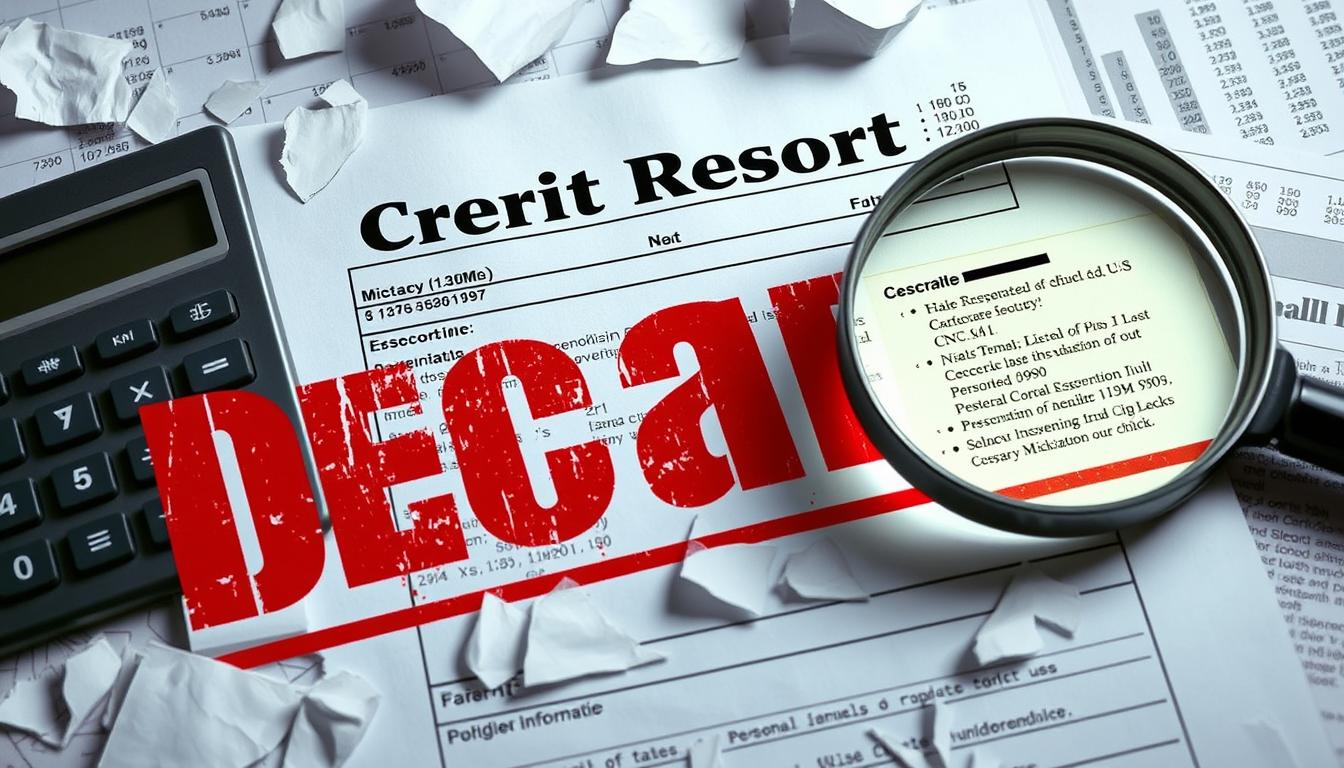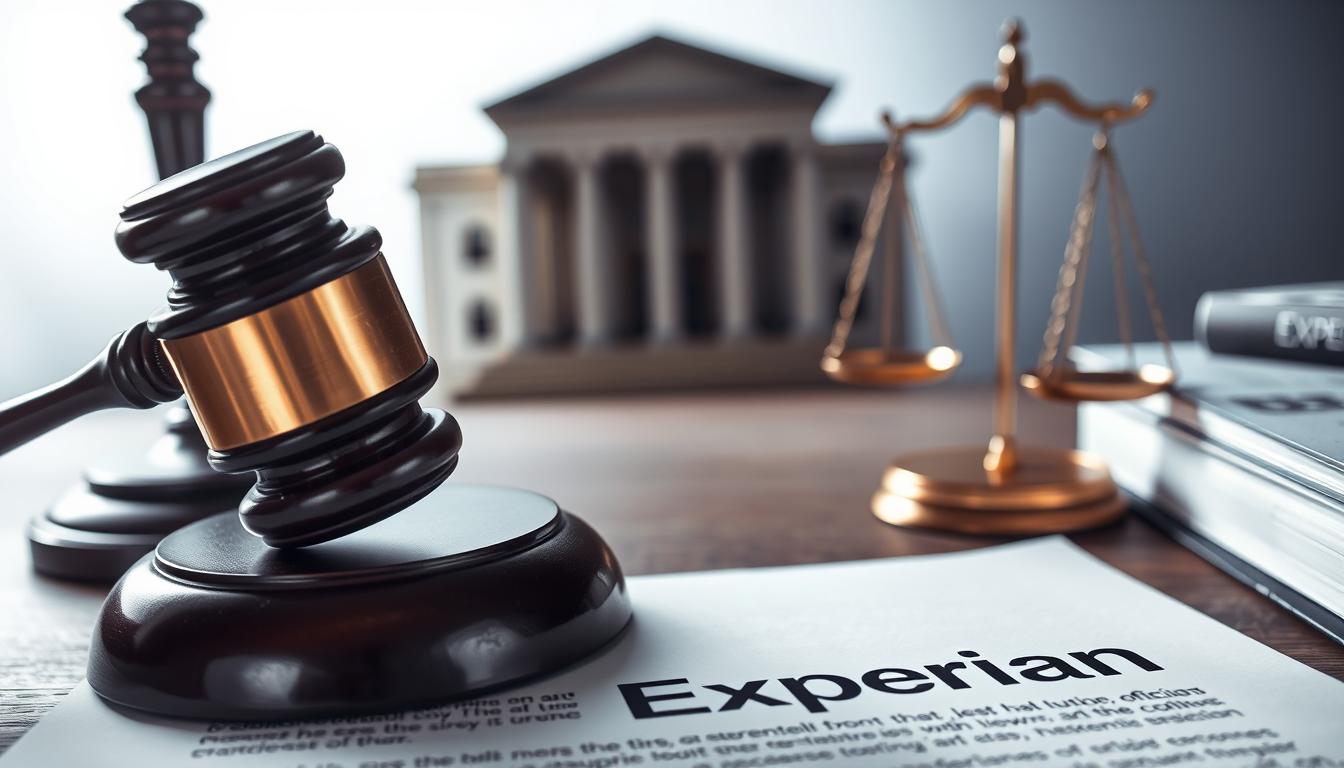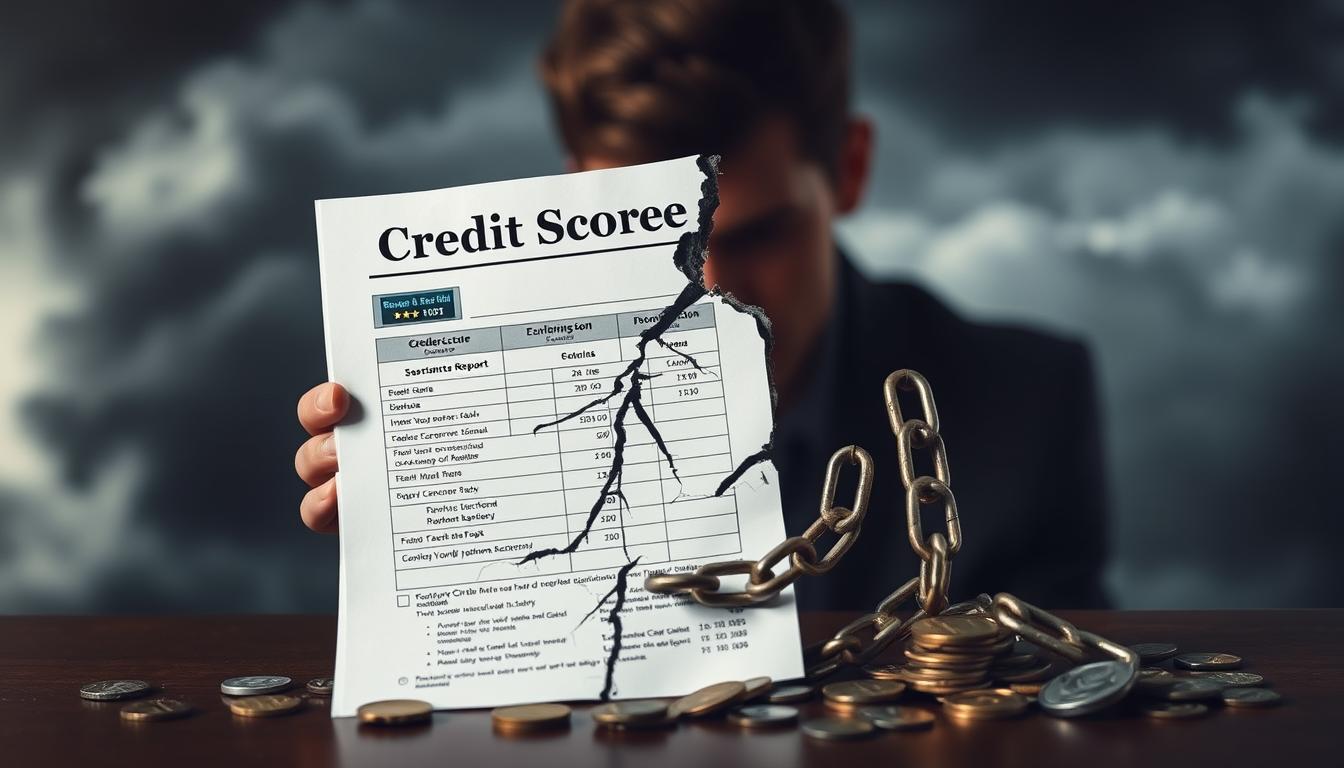Dealing with wrong credit reports can be frustrating. You have legal options to fix these issues. This guide will show you how to sue Experian for credit report errors.
We’ll cover steps to address mistakes that hurt your credit score. You’ll learn about your rights under the Fair Credit Reporting Act. We’ll also discuss gathering evidence and filing disputes.
Lastly, we’ll explore consulting with an attorney and taking legal action. These tips will help you navigate the process successfully.
Key Takeaways
- Understand your rights under the Fair Credit Reporting Act and Experian’s legal obligations
- Document evidence of inaccurate credit reporting by Experian
- Send a detailed dispute letter to Experian and follow up on the resolution
- Consult with a consumer protection attorney to evaluate the strength of your case
- File a lawsuit against Experian if necessary to address the credit reporting issues
Understanding Your Rights Under the Fair Credit Reporting Act
The Fair Credit Reporting Act (FCRA) protects consumers’ rights in credit reporting. It sets rules for credit reporting agencies like Experian. The FCRA also allows lawsuits against agencies that break these rules.
Credit Reporting Agencies’ Legal Obligations
Under the FCRA, credit reporting agencies are required to:
- Maintain accurate and complete credit reports
- Investigate consumer disputes promptly and diligently
- Correct any inaccurate or incomplete information in a consumer’s credit report
- Limit the disclosure of a consumer’s credit information to authorized parties
Grounds for Filing a Lawsuit Against Experian
You can sue Experian or other credit agencies if they break FCRA rules. Here are some reasons to file a lawsuit:
- Failing to investigate and resolve a consumer’s dispute in a timely and thorough manner
- Reporting inaccurate or incomplete information on a consumer’s credit report
- Refusing to remove or correct erroneous information, even after being notified
- Illegally disclosing a consumer’s credit information to unauthorized parties
Knowing your Fair Credit Reporting Act rights is crucial. It helps you hold credit agencies responsible for violations. You can seek legal help if needed.
Documenting Evidence of Inaccurate Credit Reporting
Detailed documentation is vital when disputing credit report errors with Experian. A strong paper trail boosts your chances of success. It’s also crucial if you need to file a lawsuit.
Start by getting credit reports from Experian, Equifax, and TransUnion. Review each report carefully to spot any errors or inaccuracies.
- Make copies of your credit reports and highlight the specific inaccuracies.
- Gather any supporting documents, such as payment records, collection notices, or correspondence with creditors, that demonstrate the errors.
- Document the impact these credit report errors have had on your credit score, ability to obtain credit, or other financial consequences.
A detailed paper trail is key when proving inaccurate credit report information. It strengthens your case and shows how serious the issues are.
“Inaccurate credit reporting can have far-reaching consequences, from higher interest rates to denied credit applications. Documenting every step is essential to building a strong case against Experian.”

Thorough documentation puts you in a better position to dispute errors with Experian. It also helps if you need to take legal action to protect your rights.
Sending a Dispute Letter to Experian
To address credit report errors, send a dispute letter to Experian. This formal letter outlines issues and requests an investigation. A well-crafted letter is crucial for starting the process and building your case.
What to Include in Your Dispute Letter
When writing to Experian, include these key elements:
- Detailed description of the inaccuracies – Clearly identify the specific items on your credit report that are incorrect or misleading.
- Supporting documentation – Gather any relevant documents, such as receipts, statements, or correspondence, that can substantiate your claims.
- Requested actions – Explicitly state the actions you want Experian to take, such as removing the inaccurate information or updating your credit file.
- Your contact information – Provide your full name, address, phone number, and email address so Experian can easily reach you regarding the dispute.
Following Up on Your Dispute
After sending your letter, follow up on your case status. Experian must investigate your concerns within a set timeframe. Stay proactive in monitoring progress.
Don’t hesitate to reach out if you don’t get a timely update. This ensures Experian addresses your experian credit disputes effectively. Follow the how to dispute with experian guidelines for best results.
Consulting with a Consumer Protection Attorney
A consumer protection attorney can be crucial when dealing with credit reporting issues. These experts protect individual rights and offer guidance against Experian. They assess your case’s strength and potential credit score damages for a possible lawsuit.
Evaluating Your Case’s Strength
A consumer protection attorney will review your case thoroughly before pursuing legal action. They’ll examine evidence of Experian’s inaccurate reporting or failure to investigate disputes. This evaluation helps determine your chances of success and available remedies.
- Identify any violations of the Fair Credit Reporting Act (FCRA) by Experian
- Assess the impact of Experian’s actions on your credit score and financial well-being
- Determine the appropriate legal claims and damages to seek in a lawsuit
- Advise on the best legal strategy to pursue against Experian
Seeking help from a consumer protection attorney can safeguard your financial future. Their expertise ensures your rights are upheld. With their guidance, you can make informed decisions about actions against Experian.
how can i sue experian
Dealing with inaccurate information from Experian can be frustrating. You might consider legal action if your credit report has errors. Suing Experian is complex, but knowing your rights can help.
The Fair Credit Reporting Act (FCRA) outlines Experian’s legal duties. They must fix errors on your credit report quickly. If they don’t, you may have grounds for a lawsuit.
- Gather evidence: Document any errors on your Experian credit report. Note any financial harm you’ve experienced as a result.
- Send a dispute letter: Write to Experian about the issues. Ask them to investigate and fix the problems.
- Consult a consumer protection attorney: If Experian doesn’t resolve the issues, seek legal advice. An attorney can assess your case and guide you.
- File a lawsuit: If your case is strong, your lawyer can help you sue Experian. You can seek damages and corrections to your report.
Suing Experian can be tough and time-consuming. However, with solid evidence and legal help, you may succeed. You could hold Experian accountable and get compensation.

| Step | Description |
|---|---|
| Gather Evidence | Thoroughly document any inaccuracies or errors on your Experian credit report, including any financial harm you’ve incurred as a result. |
| Send Dispute Letter | Submit a formal dispute letter to Experian, detailing the issues with your credit report and requesting an investigation and correction. |
| Consult Attorney | If Experian fails to resolve the issues, consider consulting a consumer protection attorney to evaluate the strength of your case. |
| File Lawsuit | If your attorney believes you have a strong case, they can help you file a lawsuit against Experian in the appropriate court jurisdiction. |
Suing Experian is challenging, but it’s possible with the right approach. Good legal guidance and strong evidence can help your case. You may get the justice and compensation you deserve.
Filing a Lawsuit Against Experian
Experian’s failure to fix credit report errors may lead to legal action. Taking Experian to court is complex, but knowing the steps can boost your chances. Understanding the process is key to a successful lawsuit.
Choosing the Proper Court Jurisdiction
Picking the right court is vital when suing Experian. Factors like damages sought and Experian’s location determine the jurisdiction. You can file in federal or state court, depending on your case details.
Preparing Your Legal Claims and Evidence
Building a strong experian lawsuit requires thorough documentation. Gather credit reports, correspondence with Experian, and proof of legal action against experian. Your lawyer will help craft solid claims backed by evidence.
Ensure all documents support your filing lawsuit against experian claim. This step is crucial for a compelling case against the credit reporting agency.
| Key Considerations | Description |
|---|---|
| Court Jurisdiction | Determine the appropriate federal or state court based on the amount of damages and Experian’s operations. |
| Legal Claims | Clearly define the legal grounds for your lawsuit, such as violations of the Fair Credit Reporting Act. |
| Supporting Evidence | Gather all relevant documentation, including credit reports, written correspondence, and any other proof of Experian’s actions. |
Careful preparation and a strong case can improve your experian lawsuit outcome. This approach increases your chances of getting fair compensation. Stay focused on building a solid legal argument throughout the process.
Potential Damages and Compensation
Suing Experian for inaccurate credit reporting may lead to various forms of compensation. These remedies can help offset the impact on your credit score and finances.
You could recover monetary compensation for direct impacts on your credit score. This may include reimbursement for lost opportunities due to erroneous information. Courts might also award damages for emotional distress caused by credit score issues.
The court may order Experian to pay punitive damages for negligent or willful misconduct. These can be substantial, sending a clear message against such practices.
You might also recover attorney’s fees and court costs. This ensures you’re not burdened with legal expenses when pursuing action against Experian.
| Type of Compensation | Description |
|---|---|
| Monetary Damages | Compensation for the direct impact on your credit score, such as lost opportunities and financial hardship. |
| Punitive Damages | Damages awarded to punish Experian for negligent or willful misconduct in credit reporting. |
| Attorney’s Fees and Court Costs | Reimbursement for the legal expenses incurred in pursuing the lawsuit against Experian. |
Knowing your rights and potential compensation helps you decide about legal action. You can seek the compensation from Experian you deserve for credit score damages.

Alternative Dispute Resolution Methods
Facing experian legal action? Consider alternative dispute resolution methods instead of court. These options, like mediation and arbitration, offer efficient ways to resolve Experian issues.
Mediation and Arbitration Options
Mediation involves you and Experian working with a neutral third-party mediator. The mediator helps both sides communicate effectively to find an agreeable solution. They don’t impose decisions.
Arbitration uses an impartial arbitrator who listens to both sides. They then make a binding decision. This process is faster and more private than court.
| Mediation | Arbitration |
|---|---|
| Collaborative process | Impartial decision-maker |
| Neutral third-party facilitator | Binding decision |
| No imposed decision | Less control over outcome |
| More cost-effective | Faster than litigation |
Before taking Experian to court, explore these alternative dispute resolution options. They might help solve your credit reporting issues more efficiently and amicably.
Preventing Future Credit Reporting Issues
Resolving credit reporting problems is just the first step. Taking proactive measures is key to preventing future issues. By being vigilant, you can safeguard your financial well-being and avoid future disputes.
Here are some effective strategies to maintain your credit report’s integrity:
- Monitor your credit report regularly: Check your credit report from all three major bureaus yearly. This helps catch errors early on.
- Utilize credit monitoring services: Sign up for alerts about changes on your credit report. This tool is valuable in preventing credit reporting issues.
- Dispute inaccuracies promptly: Notice errors? Dispute them with the credit bureau right away. Follow proper procedures and provide supporting documentation.
- Protect your personal information: Guard your Social Security number, credit card details, and banking info. This reduces identity theft risk and helps protect your credit report.
These proactive steps help you control your credit. They can prevent future credit reporting issues. Staying informed and taking action maintains an accurate credit report.
“Protecting your credit report is essential for your financial well-being. Take the necessary steps to safeguard your information and stay on top of any credit reporting discrepancies.”

| Proactive Measure | Description |
|---|---|
| Regular Credit Report Monitoring | Review your credit report from all three major bureaus at least once a year to catch any errors or discrepancies early on. |
| Credit Monitoring Services | Utilize credit monitoring services to receive alerts about changes or suspicious activity on your credit report. |
| Prompt Dispute of Inaccuracies | If you notice any errors on your credit report, dispute them with the credit bureau promptly and provide supporting documentation. |
| Safeguarding Personal Information | Protect your personal and financial information to minimize the risk of identity theft and protect your credit report. |
Conclusion
Your rights under the Fair Credit Reporting Act (FCRA) are crucial when dealing with credit reporting errors. This guide outlines steps to hold Experian accountable. You can document evidence, send dispute letters, and consult a consumer protection attorney if needed.
You have the power to challenge Experian and other credit bureaus. By asserting your rights, you can fix credit reporting mistakes. You may also seek damages and compensation for any harm caused.
This article has shown various options, including mediation, arbitration, and lawsuits against Experian. Your credit report affects your financial health. You deserve accuracy and fairness in credit reporting.
Stay vigilant and gather evidence to protect your financial future. You can sue Experian or other credit bureaus if they fail their duties. Take action to take action against inaccurate credit reporting.
“Your credit report is the foundation of your financial life, and you have the right to ensure its accuracy. Don’t hesitate to take legal action against Experian or any other credit bureau that fails to meet their obligations.”
This guide explains how can i sue experian and address credit reporting issues. Know your rights and use the legal system. Protect your finances and make sure credit bureaus do their job right.
Additional Resources
Many resources can help you deal with credit report errors. Consumer protection groups, legal aid services, and informative websites offer guidance and support. These can help you understand your options better.
The Consumer Financial Protection Bureau (CFPB) is a great resource for consumers. It provides info on credit reporting laws, dispute procedures, and consumer rights. The Federal Trade Commission (FTC) also offers guides on credit matters and identity protection.
Legal aid organizations can help you understand your rights. The National Consumer Law Center and local legal clinics offer such services. These are often free or low-cost, making them accessible to many people.

